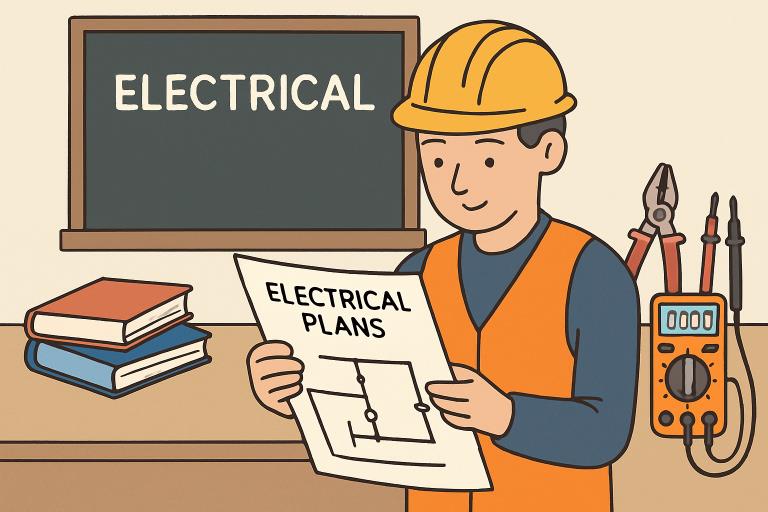Now Reading: How to Get Started in an Electrical Career
-
01
How to Get Started in an Electrical Career
How to Get Started in an Electrical Career

Key Takeaways
- Obtain a high school diploma or GED to meet basic educational requirements.
- Enroll in a recognized electrician training program to gain foundational knowledge.
- Complete an apprenticeship to acquire hands-on experience under a licensed electrician.
- Obtain the necessary licenses and certifications as required by state regulations.
- Continuously improve your skills to stay current with the latest industry developments.
Are you considering a future in the skilled trades? Embarking on a career as an electrician can offer long-term job stability, attractive salaries, and the chance to work on diverse and challenging projects. The field is experiencing growing demand for skilled workers as technology evolves and infrastructure expands. For aspiring professionals ready to make an impact, it all starts with understanding the essential steps on the journey toward becoming an electrician. If you want to learn more about relevant training opportunities, check out Apprenticeship Programs for Electricians—a great resource to help get you started on the right path.
In this comprehensive guide, you will find practical advice on how to meet industry requirements, including education, hands-on training, licensing, and mentorship. Building a strong foundation early on is crucial for unlocking new opportunities and driving career growth. Whether you are fresh out of high school or looking to change fields, the electrical industry offers a rewarding professional future for those who are committed to learning and safety.
Obtain a High School Diploma or GED
To begin your career as an electrician, obtaining a high school diploma or GED is essential. Core subjects such as mathematics, physics, and technical shop classes form the foundation of the basic knowledge required to excel in the electrical field. These subjects help you develop logical problem-solving skills and understand electrical concepts that are rooted in mathematics and science. For more information on foundational education and exploring career options in skilled trades, visit the Bureau of Labor Statistics’ page on Electricians.
Enroll in a Recognized Electrician Training Program
The next step is to join a formal training program at a community college or technical school. These electrician training programs typically include courses on electrical theory, safety codes, blueprint reading, and hands-on labs. Quality programs often emphasize safety protocols and the National Electrical Code, ensuring you have a robust foundation in industry standards. Classroom instruction combined with practical workshops helps you learn how to handle real-world scenarios before entering the workforce.
Secure an Apprenticeship
One of the most critical stages of an electrical career is completing an apprenticeship. Lasting four to five years, an apprenticeship allows trainees to work alongside seasoned professionals while earning a wage. Through organizations such as the International Brotherhood of Electrical Workers (IBEW) or the Independent Electrical Contractors (IEC), apprenticeships combine structured classroom learning with on-the-job experience. This combination not only sharpens your technical skills but also prepares you to manage complex electrical tasks safely and efficiently.
Obtain Necessary Licenses and Certifications
Every state has specific licensing requirements for electricians, usually involving the completion of an apprenticeship and passing a standardized exam. The exam often covers state and local electrical codes, theory, and safety practices. Some states may also require specialized or continuing education credits for license renewal. It’s crucial to stay up to date with regulations in your area to ensure compliance and continued professional advancement. To determine your state’s licensing criteria and steps to prepare, refer to resources like the NFPA 70E Electrical Training.
Develop Essential Skills
Beyond formal education and licensing, successful electricians require a combination of technical skills and soft skills. Critical thinking and troubleshooting proficiency are vital for diagnosing electrical issues quickly and safely. Attention to detail ensures accuracy in wiring, system installation, and repairs. Additionally, strong communication skills help you collaborate effectively with clients, inspectors, and team members. As you progress in your career, these attributes will make you a sought-after professional in the industry.
Stay Updated with Industry Advancements
The electrical sector is constantly evolving, driven by advancements in technology, the growth of renewable energy, and changes in code regulations. Ongoing training is necessary to adapt to these changes and stay competitive in the workforce. Professional organizations and trade associations often offer continuing education, seminars, and certifications to further your knowledge throughout your career. These opportunities ensure you remain proficient in emerging technologies and safety practices.
Network and Seek Mentorship
Building professional relationships can significantly impact your career trajectory. Networking with peers, mentors, and industry veterans can lead to valuable job leads, resources, and advice. Participating in professional organizations and attending trade shows or industry events creates opportunities for mentorship and professional development. Guidance from experienced electricians offers firsthand insights into the challenges and rewards of the field.
Explore Specializations
As you gain experience, you may choose to specialize in a particular area of electrical work, such as residential, commercial, or industrial systems. Specializing can unlock new opportunities for increased earning potential, job satisfaction, and career advancement. With the growth of technologies like renewable energy, smart home systems, and data cabling, the possibilities for specialization have never been greater.
Starting a career as an electrician requires dedication and a willingness to keep learning. By following these essential steps, you can establish a solid foundation for a rewarding and fulfilling career in the electrical trade. Safety, education, and adaptability are your keys to success in this vital and ever-evolving industry.





















